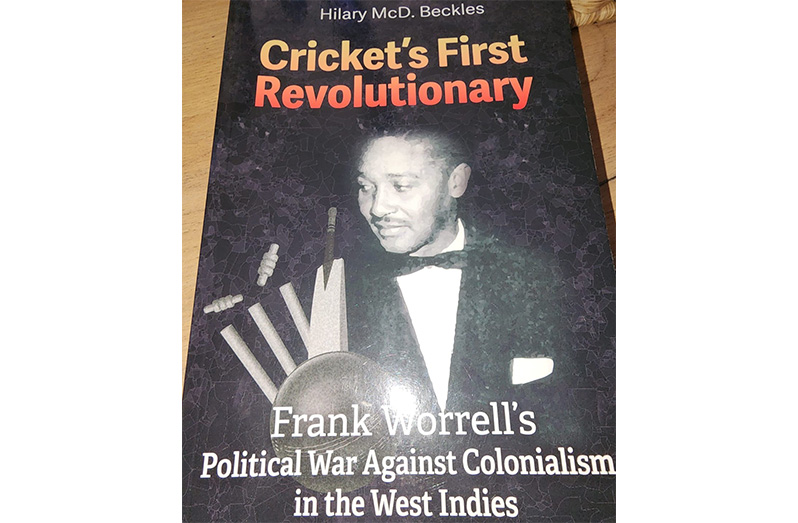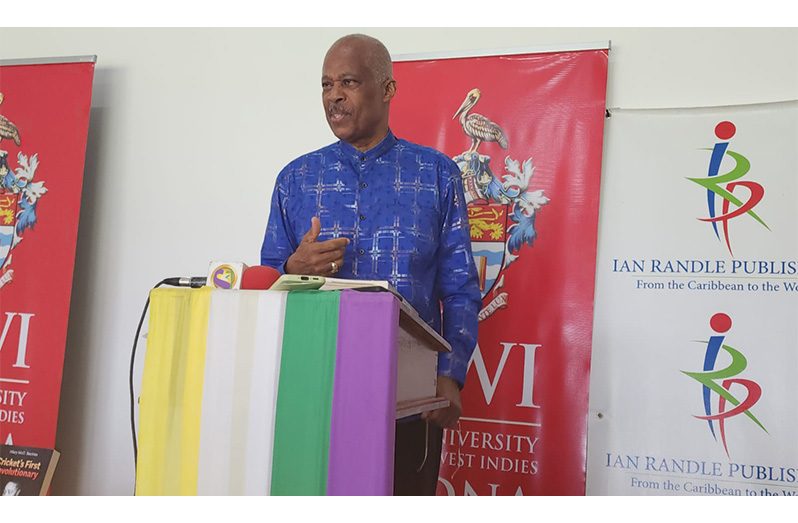Professor Sir Hilary Beckles
By Leighton Levy
IN a stirring address to journalists and members of the Jamaican cricket fraternity at the Kingston Cricket Club at Sabina Park in Kingston on Thursday last, Professor Sir Hilary Beckles paid tribute to Sir Frank Worrell, calling him “cricket’s first revolutionary” and a pivotal figure in the Caribbean’s fight against colonialism, racial inequality, and institutional elitism.
The occasion was the introduction of Beckles’ latest book, Cricket’s First Revolutionary: Frank Worrell’s Political War Against Colonialism in the West Indies, a deeply researched narrative that casts Worrell not just as a cricketing icon, but as a nation-builder and moral compass for a region in transition.
Beckles described the 1950s as a defining decade for West Indian people — a period sandwiched between the labour rebellions of the 1930s and 40s and the independence movements of the 1960s.

“It was a tug of war,” Beckles said, “as colonial rulers resisted the idea that black people could govern themselves or lead national institutions.” In that climate, Worrell emerged not just as a great batsman, but as a political force — a man determined to prove the capacity of West Indians to achieve excellence on their own terms.
Worrell’s strategy was simple but audacious: build the best cricket team in the world from the young, raw talent across the region. “He knew that excellence on the cricket field could become a symbol of political readiness,” Beckles noted.
This vision bore fruit in 1965 when the West Indies, under Worrell’s guidance as manager and with Garry Sobers as captain, defeated Australia and rose to number one in the world. It was a crowning moment, coming just five years after the legendary 1960–61 “Tie Test” tour of Australia that had earned Worrell the global admiration of fans and foes alike.
The speech traced key milestones of West Indies-Australia cricket history: 95 years since their first clash in 1930, 65 years since Worrell’s historic 1960–61 tour, 60 years since the 1965 triumph, and the 50th anniversary of the 1975 World Cup win — all echoing the enduring spirit of Worrell’s legacy. Beckles also recalled the 30th anniversary of Australia reclaiming the Frank Worrell Trophy in 1995, using the moment to underline the cyclical nature of success and the importance of visionary leadership.
A central point in Beckles’ tribute was Worrell’s role in democratising West Indies cricket. The legendary captain not only broke racial barriers as the team’s first black skipper, but also redefined leadership by fostering young, working-class players like Sobers, Wes Hall, Seymour Nurse, and Lance Gibbs — many of whom were overlooked by the cricketing elite. Despite pushback from powerful interests who felt cricket was being “taken from them,” Worrell stood firm, driven by his belief in the transformative potential of sport and the people.
At age 16, Worrell formed his own team — the ‘Starvation 11’ — inspired by the anthem of the international workers’ movement, “Arise Ye Starvelings.” It was a declaration of purpose: cricket would not belong to the elite alone. Later, disillusioned by what Beckles called Barbados’ “white supremacy apartheid,” Worrell left for Jamaica where he played domestic cricket and nurtured his political sensibilities. He would later ensure that the West Indies captaincy transitioned from the hands of white aristocrats to a “ghetto boy,” his chosen successor Garry Sobers.
Beckles, who personally attended Worrell’s state funeral and now serves as custodian of his burial site at the University of the West Indies, noted how Worrell’s contributions have been underappreciated in official Caribbean histories.
“He was not just a cricketer — he was a moral philosopher, a political strategist, and a designer of systems,” Beckles said, highlighting Worrell’s role in designing the 3Ws Oval and integrating sports infrastructure into academic environments. “Frank believed that the future of the Caribbean belonged to its poor — that intellect and talent are not the preserve of the privileged.”
But even as he honoured Worrell’s legacy, Beckles expressed disappointment at how it has been undermined in recent times. He singled out the West Indies Cricket Board’s controversial expulsion of the Combined Campuses and Colleges (CCC) team — an institution founded in the spirit of Worrell’s developmental vision — after they had won the regional championship. “They became the first team in cricket history to win a title and be kicked out the next year,” Beckles lamented. “That’s the tragedy — we still struggle to uphold the democratic ideals he fought for.”
Beckles urged his readers to remember Frank Worrell not just as a name on a trophy, but as a towering figure who used cricket as a tool of liberation, unity, and empowerment. “He didn’t just change a team,” Beckles said. “He helped change a world.”(Sportsmax)





.jpg)








